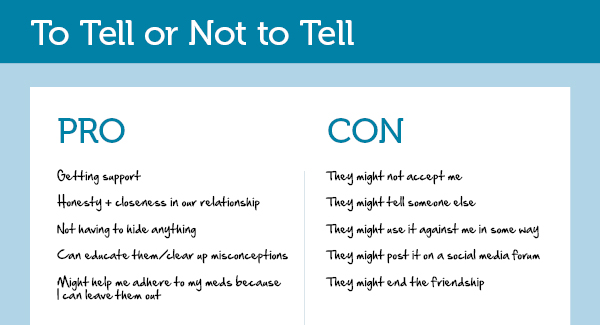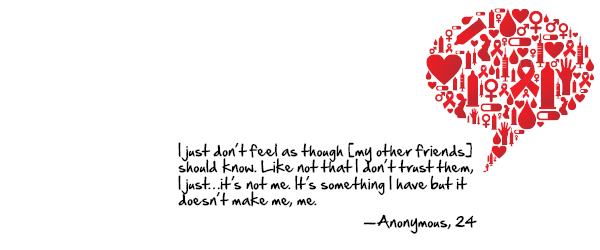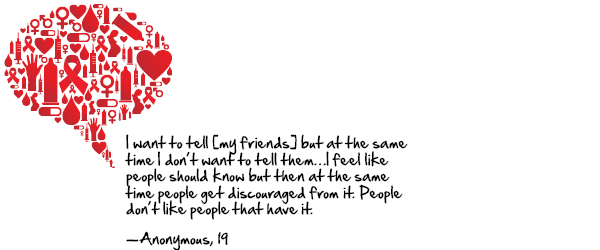 Making the decision
Making the decision
Is it appropriate to disclose?
Some people choose to disclose to many others, some people choose to disclose to a few, some people choose one, and some don’t disclose at all.
These are some things to consider when deciding whether or not it’s appropriate to disclose:
- Who do you want to tell?
- Why do you want them to know?
- What are the advantages and disadvantages (pros and cons) of telling them?
- How will disclosing my HIV status affect me – will I regret it later?
- Will I experience stigma? According to The Stigma Project, HIV stigma refers to the HIV-related shame, fear, prejudice, discrimination, guilt, and lack of knowledge that exist in the world at large. It affects the health and well-being of both HIV-positive and HIV-negative individuals.
Remember that disclosing (telling people about) your HIV status is a personal choice. There may be advantages and disadvantages to disclosing your status. It can help to write down a list of potential pros/cons.
In the sample below, Mike is thinking about disclosing his status to a friend. You may have different concerns depending on the type of relationship you have with the person you’re thinking about telling.

Who to tell
Here are some questions to ask yourself about who you want to disclose your status to:
- What does he/she know about HIV?
- What are his/her attitudes about HIV?
- Can he/she keep a secret?
- What would happen if he/she didn’t keep my status a secret?
- Is sharing my status with this person going to be a relief for me?
- Will this person be supportive towards me?

How to tell
Here are some guidelines for how to tell people about your HIV status:
- Decide where/when you want to tell
- Practice
- Be honest and direct
- Imagine ahead of time how you might cope with different responses
- End with a discussion of the next step
What happens after
Check out the following resources for real life examples of post-disclosure experiences:
- HIV and disclosure: In 2012, teens and young adults in the Boston Children’s Hospital community wrote a series of blogs about their experiences living with HIV. The material reflects their struggles, worries, and resilience, and the entries cover various aspects of daily life, including school, friendships, and worries about the future: “Living with HIV: Disclosure”

Adapted from:
Thurston, I. B., Bogart, L.M., Wachman, M., Closson, E. F., Skeer, M. R., & Mimiaga, M. J. Adaptation and Pilot Trial of an HIV Medication Adherence Intervention for Adolescents and Young Adults. Cognitive and Behavioral Practice, Special Issue.
Mimiaga, M.J., Bogart, L.M., Thurston, I.B., Skeer, M.R., Wachman, M., Closson, E.F., & Safren, S.A. (2012). Positive Strategies to Enhance Problem-Solving Skills: Positive STEPS. Therapist & Participant Manuals.
Finocchario-Kessler, S., Catley, D., Thomson, D., Bradley-Ewing, A., Berkley-Patton, J., & Goggin, K. (2012). Patient communication tools to enhance ART adherence counseling in low and high resource settings. Patient Education and Counseling, 89(1), 163-170. doi: 10.1016/j.pec.2012.03.020
Thurston, I. B., Bogart, L. M., Fields, E. L., Skeer, M. R., Sticklor, L., Closson, E. F., Safren, S. A., & Mimiaga, M. J. (May 2011). Qualitative Comparison of Barriers to Antiretroviral Medication Adherence among HIV-infected Youth. Poster presented at M. Judah Folkman Research Day, Boston, MA.
Source: Read Full Article
